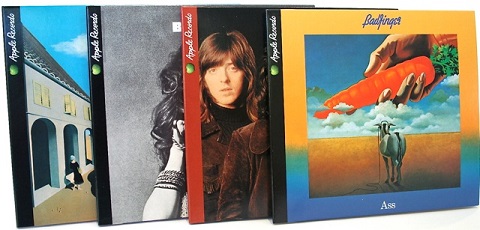Ah, the troubled and turbulent road for Badfinger. Taken under the wing of the mighty Beatles, they were off to a running start with a handful of hits — “Come And Get It, “ No Matter What,” “Day After Day,” “Baby Blue” — Fab-like in many ways (especially when the Fabs played on the records), but thrusting with more of an edge. The business side of Badfinger’s career was less spectacular. It led to a leap from Apple to Warner Brothers, the break up of the band, no income, bad management, personal anguish, and, for some, the end of the line. The band’s darkest days can not diminish the power behind the four albums they recorded for Apple — Magic Christian Music, No Dice, Straight Up and Ass. Freshly remastered and buffed out with extra tracks, liner notes and photos, the 2010 Badfinger Apple Remasters capture the golden years of a great band whose lifespan was cut short by greed and tragedy.
First signed as the Iveys to Apple, Badfinger initially received a lot of care and feeding from the Beatles camp. Paul McCartney offered the group his song “Come And Get It” on the condition that they record it exactly as he instructed. This proved to be fortuitous move that gave the group their first hit in America. “Come And Get It” was included on Magic Christian Music, a soundtrack of sorts that mixed old Iveys tunes with newer tracks written for the film (starring Peter Sellers and Ringo Starr) like “Rock Of All Ages” and “Carry On Till Tomorrow.” Not a definitive Badfinger album by any stretch, Magic Christian Music was nonetheless important in introducing the group, who had just added guitarist Joey Molland to the lineup, to a wider audience. The 2010 reissue includes five previously unreleased bonus tracks
As if the cover of No Dice wasn’t enough to pull you in, the group’s new-found chemistry kicks up the dust with a new, confident attitude and a harder rocking sound. Both Mal Evans and Geoff Emerick had a hand in the production, although the final album was largely produced by the latter. All four members — Molland, guitarist Pete Ham, bassist Tom Evans and drummer Mike Gibbins — contributed the songs. “No Matter What,” written by Ham with Mal Evans producing, would become the second Top 10 hit for Badfinger. The ominous sounding “Without You,” co-written by Ham and Evans, would become bigger than the band when Harry Nilsson covered it and hit Number one at the beginning of 1972. The song went on to win a Grammy in 1973. Twenty-two years later, Mariah Carey took it back to Number three with her version. No Dice, filled out nicely with strong deep cuts like “Better Days” and Ham’s eloquent “We’re For The Dark,” was a solid seller for Apple, sneaking inside Billboard’s Top 40 album chart for an admirable run. The reissue features five bonus tracks, including demo versions of “No Matter What” and “Without You.”
Arguably, the apex of Badfinger’s recording career with Apple lies in the grooves of their third release, Straight Up. Al Kooper, Geoff Emerick, George Harrison and Todd Rundgren all had a hand in the production, yet the album may be the most cohesive collection of songs Badfinger ever assembled. Standouts like “Take It All,” “Money,” “Name OF the Game,” “Suitcase,” “Perfection” and “It’s Over” all exhibit an unmistakable style, with a few Beatle-like flourishes to detail, but a band very much their own in execution and attack. The album produced two very different singles written by Ham: “Day After Day,” produced by Harrison and embellished with the former Beatle’s unique slide guitar (along with some beautiful piano lines put down by Leon Russell), and the infectious “Baby Blue,” the last Top 20 single for the band in the U.S. Six bonus tracks, five of which are tracks produced by Emerick, are on the 2010 reissue. Of these, “Name Of The Game” was the only one re-produced (by Harrison) for the original release. Nine of the original 12 tracks were recorded under the swift hand of Rundgren, who also mixed the whole album, but apparently didn’t rank as squarely with the band members as Harrison. Hey, it’s hard to compete with a Beatle.
Nevertheless, Rundgren produced a few tracks that ended up on the final Badfinger album for Apple, Ass. The remaining songs were co-produced by Badfinger and Chris Thomas, who had worked with Pink Floyd, Procol Harum and even bits and pieces of the White Album. At this point, Molland had stepped up as a songwriter, contributing five of the album’s 10 songs. “Get Away” and “Icicles” would have been great singles, but that honor went to Ham’s “Apple Of My Eye,” which peaked at 102 and would become the last single released on Apple by someone other than a former Beatle. The song is about the group’s departure from the troubled label, which almost folded in the midst of the Beatles’ official dissolution in 1975, put stayed in business reissuing Beatles product in numerous guises and campaigns. The five bonus tracks on the 2010 reissue of Ass are previously unreleased versions and mixes of some of the album’s songs, all produced by Badfinger.
According Molland, Allen Klein had a lot to do with Badfinger leaving Apple for Warner Brothers. But Klein had little to do with what happen next when manager Stan Polley decided to steal the group’s hefty advances from the $6 million deal with Warner, effectively leaving the members of Badfinger in desperate financial dire straits. Overcome by depression and resentment toward Polley, Ham took his life in 1975. Subsequent Badfinger projects failed to capture the essence of the Apple years. Tom Evans followed Ham in 1983, and Gibbins died in 2005. Molland still plays shows under the name Badfinger, the bulk of the material no doubt coming from the four classic albums the band recorded for Apple Records. Outside of the Beatles, Badfinger was the label’s reigning attraction and worthy of the same level of Abbey Road remastering applied to the Fabs’ catalog in 2009.
~ Shawn Perry




















